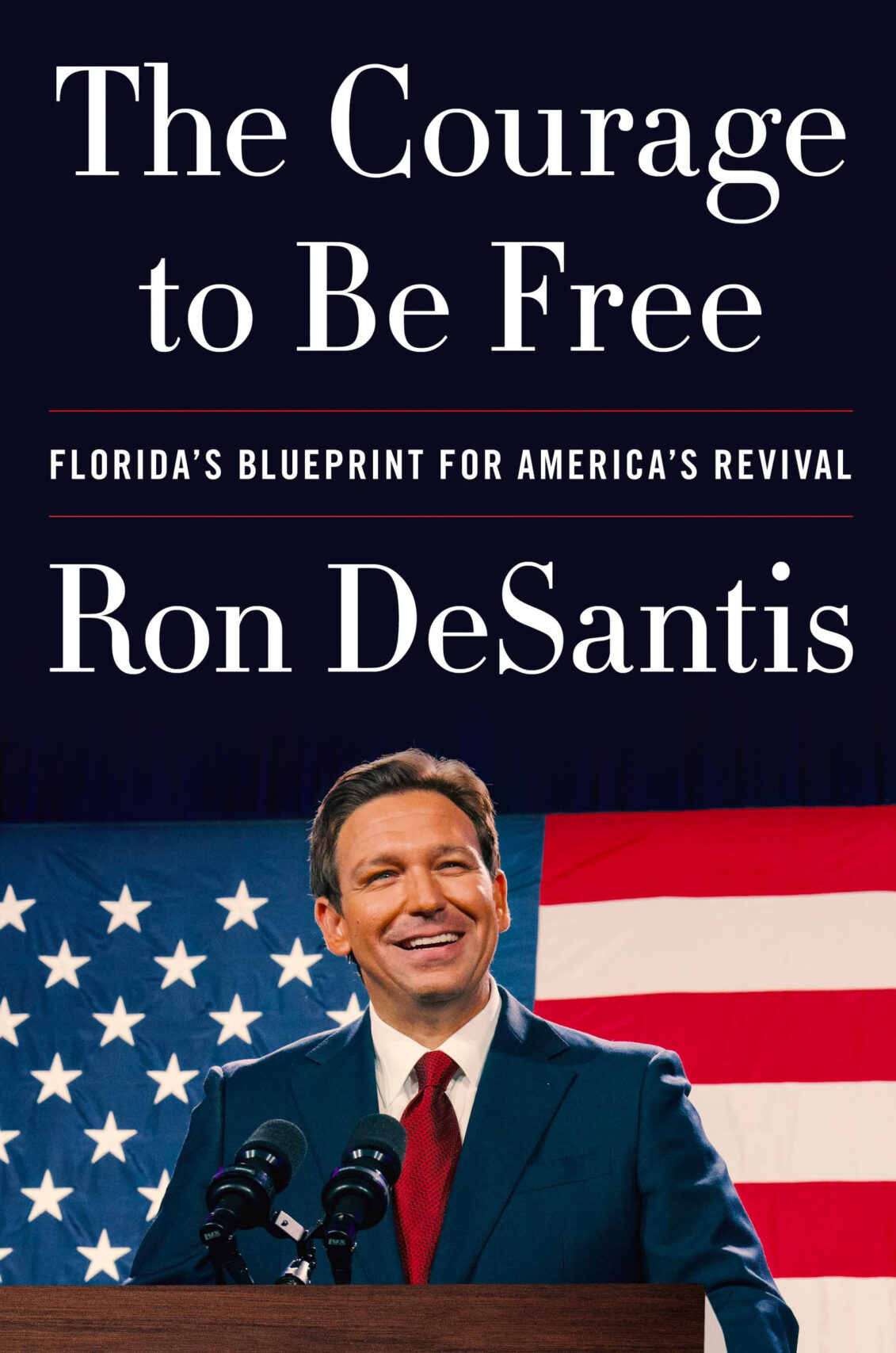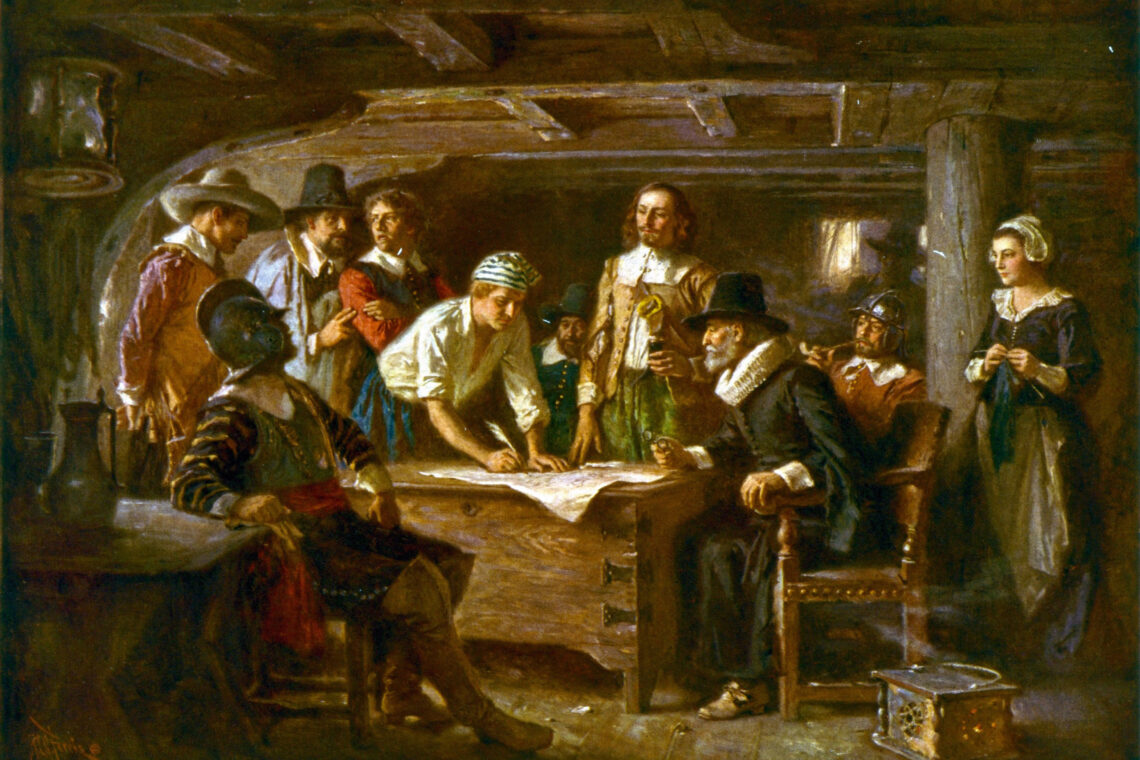On February 28, 2023, the print edition of the New York Times published a review of Florida’s governor Ron DeSantis’ book The Courage to Be Free. The Times reviewer, Jennifer Szalai, did a good job pointing out the issues with which she disagrees, and even compares the book’s dry style to the more laissez-faire one in Dreams From Our Founding Fathers, published in 2011, just before the author embarked on his political career. Towards the end of her review, Szalai issues a tough verdict: “Reading books, even bad ones, can be a goad to thinking, but what DeSantis seems to be doing in The Courage to Be Free, is to insist that Americans should stop worrying and let him do all the thinking for them.” She later adds that the author’s “bullying sense of superiority is unmistakable, even if he tries to gussy it up in a mantle of freedom.” Why, I wondered, would a commitment to principle, essential to any healthy sense of leadership, be interpreted as a “bullying sense of superiority”?

The following day (March 1, 2023), the print edition of the Wall Street Journal published an opinion piece (mostly a verbatim excerpt from The Courage to Be Free ) by DeSantis himself explaining why he stood up to the corporate behemoth Disney which, for decades, had benefited from a lavish form of corporate welfare in Florida. But when Disney, headquartered in Burbank, California, decided to fight Florida’s new law, Parental Rights in Education Act, the governor worked with the legislature to revoke Disney’s privileges because, like many “woke” companies, it had become a political combatant in the culture wars trying to cancel a state law to appease the ideology of its employees back in California. DeSantis also argues that what Disney, a publicly traded company, did is a serious abdication of its fiduciary duty towards its shareholders.
Sure enough, as mentioned in The Courage to Be Free, “within six weeks of Disney taking a stand in favor of injecting sexuality and gender ideology into kindergarten through third-grade classrooms, the company’s market capitalization plunged by more than $63 billion, and its brand suffered the biggest decline in its history. One poll showed the company’s net favorability rating dropping from +56 prior to the company’s decision to take sides to +3 after it. This stunning decline of 53 percentage points must have sent shock waves back at Disney’s headquarters in Burbank.” If DeSantis comes across as a bit boastful when he says that Florida is “the state where woke goes to die,” he is, in a way, taking a new stand against corporate power that “old-guard” Republican “corporatists” are not equipped to handle. It is as a new type of Republican that he confronts one of the most powerful corporations in America. Does such a courageous stance make him a bully or exhibit his strong sense of independence?
I mention the Disney episode because I want to show that—one’s ideological biases aside—discussing the role of corporations in political life is a matter of vital importance not only to Americans but also to the whole world. In a book that Szalai calls a memoir, there is, in fact, no self-indulgence, if not for essential biographical facts that help explain DeSantis’s journey in life. If anything, the book is a principled conservative’s civics manual on proper citizenship and how to unpack some of the burning issues that are endangering the foundations of the republic today. As someone who thinks that Karl Marx is indispensable to understanding the workings and depredations of capitalism, the governor’s clichéd and facile dismissals of Marxism, or his constant references to a vaguely defined left, do not prevent me from trying to take him seriously, because only in doing so can one truly engage in constructive conversations. We must accept the premise that there is more than one way to understand the world if we want to avoid the traps of ideological purity.
The son of deeply Catholic parents who hail from “blue-collar, working-class areas of Western Pennsylvania and northwest Ohio,” DeSantis is a “proud Florida native” who leaves the state only when he has to study at Yale and Harvard before he enlists in the U.S. Navy and is eventually deployed to the notorious al-Anbar Province in Iraq with a Navy SEAL unit as a Judge Advocate General (JAG) officer. Although he graduates with honors from Harvard Law School—the “command centre of American liberalism,” as the Economist once called it—he chooses a life of service to nation, not one of immediate riches in corporate offices, despite the fact that student debt is weighing heavily on him. His college and Navy experiences are not without impact on his beliefs and thinking. To the financially struggling, hitherto apolitical student who couldn’t afford to study abroad or go on vacation, the “unbridled leftism” he experiences at Yale as an undergraduate, pushes him to the right, just as it continues to do to other students today.
DeSantis’s experience in Iraq shows him that the terrorist Islamic group al-Qaeda can be defeated, but that nation-building à la americaine is a dangerous fool’s errand. “The cultural differences were too vast for Iraq to embrace Madisonian constitutionalism,” DeSantis writes. “In fact, the Iraqis considered ‘freedom’ to be submission to sharia law, not the enactment of a liberal democracy.” Such a realization leads him to wonder about “the cost in American blood and treasure” in the futile pursuit of extricating tyranny from the world. Thus, before he chooses a career in politics, the young DeSantis witnesses “firsthand the folly of using the military to socially engineer a foreign society.” To him, America’s “messianic impulse—that the US had both the right and the obligation to promote democracy, by force, if necessary, around the world—was grounded in Wilsonian moralism, not in a clear-eyed view of American interests.”
Following his election to Congress, DeSantis takes his critical conservative mind to Washington in January 2013, vowing to keep his distance from “the entire DC ecosystem” by reading the texts of proposed legislations, declining “the congressional pension and health-care plan,” sleeping in his office, and filing doomed legislations and even constitutional amendments to curtail the power of members of Congress and eliminate their special privileges. After three terms of pushing against deeply entrenched interests that are antithetical to the spirit of American democracy, the married man and new father eventually leaves a city so removed from people’s lives that it might as well be a country all its own and returns to his native state. With the support of a tweet by President Trump and relying on his own intellectual strength in a live debate with his Republican rival, DeSantis is able to prevail in a race for governor in the “third-largest state by population” in the nation (more than twenty million) and one with two time zones.
Once again, the moment DeSantis assumes power on January 8, 2019, he does his own reading of main texts, refuses to do any polling, and chooses to lead on a series of reforms to make the Sunshine State brighter than ever. During the Covid crisis, he valiantly resists conventional health mandates, fighting for Floridians’ right to decide for themselves whether to vaccinate or not, without the threat of losing their employment. He questions “crackpot theories” such as the New York Times-sponsored 1619 Project, rightly arguing—in the same vein Martin Luther King Jr. did—that the American Revolution of 1776 (however imperfect or incomplete it may have been at that time) launched a freedom movement that is still unfolding to this day. The passage below could have been written by any historian of the United States:
The American Revolution—by rejecting the divine right of kings and embracing the idea of natural, God-given rights—began the process that ultimately led to the end of slavery in America following the Civil War. Of course, it took the birth of the Republican Party, founded to oppose the spread of slavery into the western territories, and the election of Abraham Lincoln, the first Republican president, to bring about the abolition of slavery, initially (and incompletely) through Lincoln’s Emancipation Proclamation and then through the passage of the Thirteenth Amendment by the Republican-dominated Congress.
In the next paragraph, he sums up the legacy of the American Revolution by saying that “the full promise of the Declaration of Independence was not fulfilled in 1776 for all Americans, but the Founders established a revolutionary project whose ideals changed the course of human history.”
It is DeSantis’s deep commitment to America’s founding principles that leads him to confront the overreach of the massive “federal administrative state,” as well as the unbridled power of Big Tech companies. To him, James Madison was clear when he stated that most powers should reside within state governments and that “the powers delegated by the proposed Constitution to the federal government are few and defined.”
One example of government overreach happened during the Covid pandemic when people were afraid and unsettled by the new, mysterious virus. What started out as a modest measure to flatten the curve turned into a full-scale war, with lockdowns, mask mandates, and coerced vaccinations to eradicate the virus. The rise of a “biomedical security state” felt profoundly anti-American to DeSantis, so he did what he does best: read and research. Unlike what was happening in New York and other states, he “signed an executive order in mid-March 2020 prohibiting hospitals from discharging COVID-positive patients back into nursing homes.” His focus on protecting the elderly first and foremost while keeping Florida and its schools open turned out to be the best approach, even though he was ruthlessly attacked at the time. “As the iron curtain of Faucism descended across our continent,” DeSantis writes, “the State of Florida stood resolutely in the way.”
The Free State of Florida, or “America’s West Berlin,” now beckoned to all Americans languishing in lockdown states and attracting fresh new businesses to the state. In the year ending in July 2020, “Florida saw the largest gain of residents in the nation, with more than 252,700 new residents, outpacing the 216,949 new residents in Texas over that one-year period. The states with the largest net declines in residents were California, New York, and Illinois, respectively.” This exodus to the “promised land” of Florida was bolstered by “a net migration of $23.7 billion worth of adjusted gross income,” far outpacing “the next closest state, Texas,” with only “a net gain of $ 6.3 billion.” With more residents but half the budget of the State of New York, and about the same budget as that of New York City alone, Florida does better than New York on a whole range of social services, not least of which is K-12 and public higher education.
Taking on the titans of Big Tech is not for the faint of heart. As neutral disseminators (not publishers) of information, Big Tech companies enjoy “strong liability protections under federal law,” but when they engage in censorship at the behest of a government agency like the CDC, then such companies, DeSantis argues, function “as de facto arms of the state” and “their ostensibly private nature does not relieve the government of its duty to abide by the First Amendment; otherwise, the federal government could simply subcontract out violations of the Bill of Rights to private actors. Therefore, to the extent that Big Tech companies are colluding with the federal government to censor political speech, they are functioning as an arm of the state and must comply with the First Amendment. Their censorship would therefore be unconstitutional.” Because these companies control access to the “new public square” in our democracy today, they can’t uphold “a republic form of government [that] demands that free people be able to engage in robust debate about political issues.”
Another major area of concern for the governor is protecting the integrity of elections. In a report issued in 2005, former president Jimmy Carter and former secretary of state James Baker concluded that “citizens who vote at home, at nursing homes, at the workplace, or in church are more susceptible to pressure, overt and subtle, or to intimidation” and further warned that “vote buying schemes are far more difficult to detect when citizens vote by mail.” More than ten years after this report was issued, California introduced ballot harvesting, allowing agents or operatives to collect and submit other people’s mail-in ballots. These practices drove the Governor and the Florida Legislature to enact “a sweeping package of reforms to fortify election integrity.” Such measures include prohibiting and criminalizing ballot harvesting, as well as requiring voter ID for absentee ballot requests or when voting in person. Together with other controls, these measures allowed Florida to count 99 percent of its vote by midnight on election day in November 2020. Such a record “stood in stark contrast to other states that did not even know how many votes were outstanding and that took days, or even weeks, to count the ballots.”
To me, DeSantis seems to be animated by a fervent attachment to the founding spirit of his nation and to the well-being of his fellow Americans. He may be a conservative or Republican, but these are mere labels that state membership in one political party or another and cloud our insights into the man’s guiding principles and his approach to good citizenship. When he emphasizes and invests in an American civics education, he does so out of a genuine concern for the future of his nation’s democracy. In this case, he is only applying Abraham Lincoln’s prescription that we foster in our youth “a reverence for the constitution and laws” until they “become the political religion of the nation.” Our students are the future of the nation, so it is incumbent upon us to make sure “they have a solid foundation in the core principles of our republican system of government and a firm idea of what it means to be an American.”
At one point in his book, DeSantis recalls his grandmother who “never voted for a Republican for any office in her life because she considered the Democrats to represent God-fearing, working-class people like herself.” It is his grandmother’s spirit that the dutiful grandson is upholding with all his might. Despite his education in bastions of class privilege, his loyalty to the hard-working rank-and-file makes him deeply suspicious of entitled elites, those “citizens of the world” who have inflicted incalculable damage on the nation by supporting “military adventurism around the world,” relying on “a vast administrative state” at odds with Madisonian principles to push their agendas, instituting lockdowns based on insufficient information or faulty modeling, using the power of the economy to impose self-serving ideological beliefs, empowering rivals like China at the expense of their country, and depriving citizens of their First Amendment rights through the control of media platforms. This is why DeSantis, while fiercely anti-Communist, thinks that “a populist impulse to counteract the failures of an unrepresentative ruling class with a more representative and successful government represents a logical response by the people who bear the brunt of their failures.”
Book reviews in daily newspapers are, by necessity, short and opinionated in order to speak to the already converted. Jennifer Szalai’s review in the New York Times describes a man who has a superiority complex, but what I find—and what I have tried to document with ample quotations—is a profoundly thoughtful man questioning America’s elites and how they traded their nation’s best interests for vague notions of cultural sophistication and global awareness. Contesting corporate attempts to subvert democratic processes and opposing reckless military interventions abroad are not Republican or conservative principles; these are concerns that are widely shared by all sorts of movements dedicated to social justice. To be sure, one could disagree on whether the United States was founded in 1776 or 1619, but defending the 1776 thesis is not unreasonable, given that prominent historians also firmly do so. A civics education that reinforces love of country (without obfuscating its shortfalls) is also reasonable, although one could debate the details of the curriculum. Signing a law disallowing “biological men” to compete in women’s sports might be read as a conservative act, but the role of gender in sports is a supercharged and unsettled issue, one that merits extensive research and debate.
In short, DeSantis’s book is about one man’s vision of how to revitalize and protect the best interests of his fellow Americans. Whether it is his opening salvo in the quest for the presidency I cannot tell, even though that’s how most people are reading it. I think the native Floridian must be joking when he titles his conclusion “Make America Florida” because he surely knows that America is a vast and elusive continent that needs an entirely different approach. But having sharpened his skills in a state that could be a stand-alone nation, he is certainly as qualified as any other American to provide robust and thoughtful leadership to the country he loves.
The Courage to Be Free is Ron DeSantis’s own declaration of independence, a notice to those who elevate their own private interests over those of the nation that he will never be beholden to them. That is, at least, the political message I get from what is otherwise a thoughtful and well-argued book.





Comments are moderated by the editor and may not appear on this discussion until they have been reviewed and deemed appropriate for posting. All information collected is handled in a manner consistent with our privacy policy.